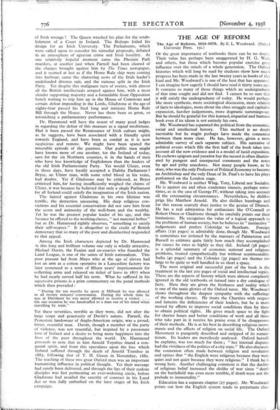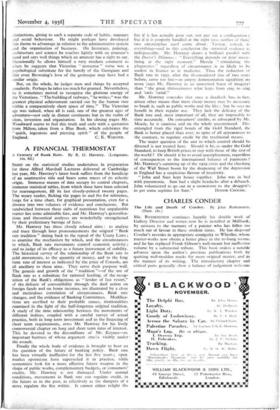THE AGE OF REFORM
OF the great importance of textbooks there can be no doubt. Their value has perhaps been exaggerated by H. G. Wells and others, but those which become popular exercise great influence over the minds of a whole generation. The Oxford histories which will long be read by students show how much progress has been made in the last twenty years in books of this kind and Mr. Woodward's is one of the best that has appeared. I can imagine how eagerly I should have read it thirty years ago. It contains so many of those things which an undergraduate of that time sought and did not find. I cannot be so sure that it will satisfy the undergraduate of today. He would perhaps like more synthesis, more sociological discussion, more relation of facts to ideologies, more about the class struggle and capitalist expansion, harsher judgements, more dogmatic summings-up. But he should be grateful for this learned, impartial and humane book even if its idiom is not entirely his own.
Mr. Woodward has separated the political from the economic, social and intellectual history. This method is no doubt inevitable but he might perhaps have made the connexion between them more clear. He has, however, given a most admirable survey of each separate subject. His narrative of political events which fills the first half of the book takes into account all the new evidence and is a model of lucid exposition. He eschews epigram and paradox but the record is often illumin- ated by pungent and unexpected comments and the notes by apt and pithy anecdotes. Not many people know, as he does, who was the only Professor of Political Economy to become an Archbishop and the only Dean of St. Paul's to have his plays performed on the London stage.
Mr. Woodward is neither Whig, Tory, Liberal nor Socialist. He is against sin and often condemns sinners, perhaps some- times, as in the case of George IV, without taking into account all the extenuating circumstances. Nevertheless, he dislikes prigs like Matthew Arnold. He also dislikes humbugs and for this reason scarcely does justice to the genius of Disraeli. He has a real admiration for enthusiasts like O'Connell or Robert Owen or Gladstone though he carefully points out their limitations. He recognises the value of a logical approach to the problems of human society, but he believes in " instinctive " judgements and prefers Coleridge to Bentham. Foreign affairs (x3o pages) is admirably done, though Mr. Woodward is sometimes too irritated by the manners of Palmerston and Russell to estimate quite fairly how much they accomplished for causes he rates as highly as they did. Ireland (38 pages) is a splendid summary of economic national and religious problems, treated sympathetically but without sentimentality. India (40 pages) and the Colonies (35 pages) are themes too large to be quite so well handled in so short a space.
The most original and successful part of the book is the treatment in the last 200 pages of social and intellectual topics. These are the aspects of history which were almost completely ignored in the old textbooks or turned into a dry catalogue of facts. Here they are given the freshness and reality which is one of the main glories of the Oxford tutor. Mr. Woodward shows throughout the deepest sympathy with the sufferings of the working classes. He treats the Chartists with respect and laments the deficiencies of their leaders, but he is more moved by efforts to improve social conditions than by those to obtain political rights. He gives much space to the fight for shorter hours and better conditions of work and all those who take part in it receive his praise even if he disapproves of their methods. He is at his best in describing religious move- ments and the effects of religion on social life. The Oxford Movement is pungently described and stripped of its roman- ticism. Its leaders are mercilessly analysed. Oxford herself, he explains, was too much for them ; " her internal disputes had the vividness of the politics of a city state." He also discusses the connexion often made between religion and revolution and opines that " the English were religious because they were quiet and not quiet because they were religious." I think he is wrong here. Another challenging comment is that the decline of religious belief increased the dislike of war since " death on the battlefield was even snore terrible, if death were not the prelude to immortality."
Education has a separate chapter (27 pages). Mr. Woodward points out how the English system tends to perpetuate class
distinctions, giving to each a separate code of habits, manners and social behaviour. He might perhaps have developed this theme to advantage in relation to the administrative system and the organisation of business. On literature, painting, architecture and science he touches lightly with an amateur's hand and says well things which an amateur has a right to say. Occasionally he allows himself a very modem comment as when he suggests that Victorian " nonsense " verse was a psychological substitute for the bawdy of the Georgians and that even Browning's love of the grotesque may have had a similar origin.
But, on the whole, he judges men and things by accepted standards. Perhaps he takes too much for granted. Nevertheless, he is sometimes moved to recognise the glorious energy of the Victorians. "The building of railways, " he writes," was the greatest physical achievement carried out by the human race within a comparatively short space of time." The Victorian age was indeed, when all is said, one of the greatest ages of adventure—not only in distant continents but in the realm of ideas, invention and organisation. In his closing pages Mr. Woodward seems to feel this truth and ends with a quotation from Milton, taken from a Blue Book, which celebrates the " quick, ingenious and piercing spirit " of the people of











































 Previous page
Previous page